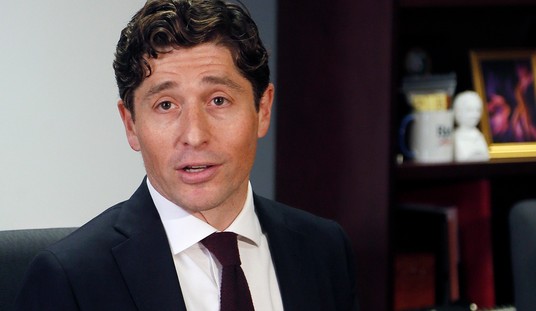If you have time to watch this segment from Fox News Sunday yesterday, don’t miss it — at least the first half. Chris Wallace interviewed David Plouffe about Barack Obama’s deficit-reduction plan and dismantled it before Plouffe’s eyes. It extends far too long to excerpt, so either watch it all or read through the transcript in order to appreciate the comprehensive scrutiny Wallace brings, and the lack of response Plouffe provides:
Don’t miss the whole exchange in the video. This is the best exchange, which last for several minutes, but there is plenty more:
WALLACE: But, Mr. Plouffe, what you are talking about $200 billion in tax cuts that end in the next 15 months. You’re talking about $2 trillion in tax increases that will go on for next decade. Between his jobs plan — and I want to break this down because it’s important — between his jobs plan and cutting the deficit, the president wants $1.5 trillion in new taxes over the next decade.
Let’s put it up on the screen — letting the Bush tax cuts for the wealthy expire, $866 billion; limiting the deductions for families making $250,000 a year, $410 billion; closing loopholes and tax breaks, $300 billion. And on top of that — on top of that, $1.5 trillion, another $500 billion in new taxes to pay for Obamacare, for a total of $2 trillion. …
He said raising taxes. He wasn’t talking about raising taxes on the middle, wealthy or whatever. He said raising taxes will take demand out of the economy and put businesses on the hole. Was he right then or is he right now? Because he can’t be both.
PLOUFFE: Well, first of all, in his plan, there would be no tax increases on the wealthy, closing corporate loopholes until 2013, just as we have to make sure the spending cuts are done carefully, over time we do the same thing with revenue. But, again, we have to reduce the deficits. You know, these are choices we have to make as a country. So, if we all we have to reduce the deficit by about $4 trillion, we’re going to cut education by a third, ask seniors to $6,000 more in Medicare to pay $200,000 tax cuts for the millionaires.
That’s what, you know, Mitt Romney and Rick Perry and all the congressional leaders want to do. Or are we doing spending cuts and ask the wealthy to pay their fair share?
WALLACE: OK.
PLOUFFE: So, this is the right approach to the country. And the vast majority of the people, the job creators, the small business owners, they’re going to get tax cuts. President cut 15 taxes for them over the course of two years roughly. And he wants to do more. Every middle class family, $1,500 tax cut.
So, this is significant tax relief for just about everybody in the country.WALLACE: But two problems it seems to with what — with what you say. First of all, you say, well, this isn’t going to happen until 2013. I know the politicians here in town and on the Republican campaign trail, all they’re thinking about is November of 2012. But if you are businessman, you are thinking five years down the road, 10 years down the road. So, the idea, well, I may get a $1,000 tax cut in 2012, but I’m going to get $2 trillion of tax increases over the next decade doesn’t — isn’t likely to make them go out and hire more people. I also want to get back to this issue of fair share, which you keep talking about. Put it up on the screen. According to the nonpartisan Tax Foundation, the 1 percent of households with the highest incomes pay 38 percent of federal income taxes. The top 10 percent pay 70 percent of federal income taxes. Meanwhile, 46 percent of households pay no federal income tax at all.
And the president thinks that the wealthy aren’t paying the fair share?
PLOUFFE: Listen, you can manipulate statistics in any way you want. The fact of the matter is 22,000 people —
WALLACE: Wait, wait — you don’t think that top 10 percent households are paying 70 percent of taxes?
PLOUFFE: Well, they are making a ton of money. Twenty-two thousand people —
WALLACE: But they’re paying 70 percent of the taxes.
PLOUFFE: Twenty-two millionaires pay less effective tax rate, under 15 percent. So, we have inequities. The American people are screaming out saying it’s unfair that the wealthiest, the largest corporations who can afford the best attorneys, the best accountants, take advantage of these special tax treatments that the lobbyist have, along with lawmakers, have cooked in the books here. So, the question is: how are we going to move forward as a country? Are we going to, yes, do some spending cuts that don’t gutter our ability to do things like education and innovation? And are we going to ask the wealthiest to pay a little bit more? All we’re talking about is going back to the rates —
WALLACE: Because 70 percent isn’t enough?
PLOUFFE: Well, again, they make a ton of money. That statistic, it’s a question —
WALLACE: And they pay a ton of taxes.
PLOUFFE: Well, they do. The question is, in raw deals.
WALLACE: They pay more than a ton.
PLOUFFE: In raw. The question is, from a percentage standpoint, they are paying less effective tax rate as Warren Buffett was saying —
WALLACE: That is not — it is not true.
PLOUFFE: Twenty-two thousand —
WALLACE: There may be a certain number. You talk about being able to manipulate the numbers. The fact is, people at the highest end pay the highest percentage of taxes. They’re paying a higher percentage than middle class people are. It is an effective tax rate.
Wallace wasn’t the only one deriding the so-called “Buffett rule” on yesterday’s talk shows. Michael Bloomberg, not exactly known as a Tea Party conservative, called it “just theatrics” and told David Gregory on NBC said that theatrics don’t make for good economic policy:
Facts are stubborn things indeed.








Join the conversation as a VIP Member